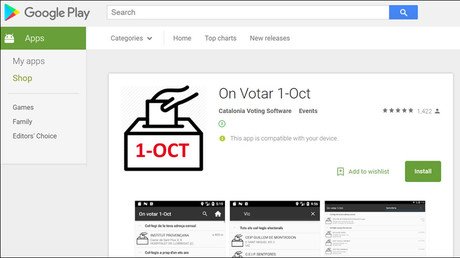Madrid struggles to close Catalonia polling stations on eve of referendum
Catalonia is gearing up for an independence referendum on Sunday despite attempts to hinder the process by the government in Madrid, which considers it illegal. Police trying to seal polling stations have faced resistance from occupiers keen to vote.
Catalans have staged numerous protests and occupied polling stations to secure their right to vote. Over six thousand ballot boxes will be used, and there are more than 2,300 polling stations across the region.
The referendum was not authorized by the federal authorities and Spain’s Constitutional Court has ruled that it is illegal. Police have been ordered to remove people occupying polling stations, located in schools and other facilities, Reuters reports citing a government source.
The federal authorities said on Saturday that police had sealed off 1,300 of 2,315 schools in Catalonia which had been designated as polling stations, according to Reuters.
Prior to the vote, Madrid launched a crackdown on Catalonia, local government buildings were raided and top-ranking Catalonian officials, including Junior Economy Minister Josep Maria Jové, were arrested over referendum documents.
The government also wanted to take direct control over the local police force in a bid to halt the upcoming vote. The action was denounced it as “intervention attempt” by Catalonia’s Interior Minister, Joaquim Forn, who also said that the local police refused to comply with the order.
The Spanish government forced Google to block an application which provided information to the citizens on where and how to vote. Madrid also ordered the shutdown of all polling stations and deployed thousands of its troops to the region.
On Saturday, the Civil Guard raided the Center of Telecommunications and Technologies of Information (CTTI) to switch off applications that could be used to count the results.
READ MORE: Catalan president gives instructions on Twitter after referendum website blocked
However, to make sure the vote happens locals staged numerous sit-ins at schools and other sites that are supposed to serve as polling stations.
“What you see here was not planned beforehand. We are all neighbors of this area of the city and we are defending the place where we want to vote on Sunday. If you turn around you will see more people, when the doors of this school open-we will just swap places in order to keep defending this voting place,” Juan Sebastian, one of the locals staying at a school, told RT.
“Due to the threat of the sealing of schools, people from the educational community have organized themselves, not only here, but all over Catalonia, to make sure we can vote freely on Sunday,” Miguel Angel Torrijos, a father of one of the school children, told RT’s Ruptly news video agency.
People across the region have been protesting the crackdown on the vote. Earlier this week, farmers staged a protest in Barcelona, flying Catalonian flags on their tractors and chanting “we will vote.”
On Thursday, Catalan firefighters unfurled a giant banner in front of the Museum of Catalan History in Barcelona, depicting a ballot box with the words “love democracy” written across it.
The Spanish government still says the referendum is illegal and vows that it will not allow this to happen.
"I insist: there will be no referendum on October 1st,” government spokesperson Inigo Mendez de Vigo said on Friday during a press conference following the weekly cabinet meeting.
Meanwhile, not everyone is happy over the upcoming referendum. On Saturday, the day before the vote, a protest was held in Barcelona to protest against the referendum.
Crowds gathered outside the Catalan government headquarters in Barcelona Thursday to protest against Sunday’s vote.
Activists held a mock referendum in the Spanish capital, Madrid, on Friday, giving residents the opportunity to “vote” on whether they want “Catalonia to remain part of Spain” and place their “ballots” into an improvised ballot box. Hundreds of anti-referendum activists took part.
As the division in Spanish society grows, Spain’s European partners are apparently not eager to intervene.
“I believe this is a Spanish problem in which [sic] we can do little. It's a problem of respecting Spanish laws that Spaniards have to resolve,” Antonio Tajani, European Parliament President said answering journalists’ questions on whether any form of mediation could be offered.
Member of the European Parliament Stelios Kouloglou believes that the EU should intervene as the actions of the Spanish federal government are unreasonable, he told RT. Kouloglou will observe Sunday’s vote and has spoken with Catalan officials, who complained about “very brutal violations of the democratic rights” by Madrid.
“The EU should interfere not to take sides…but just to say that those measures taken by the government of Madrid are not acceptable,” Kouloglou said.













